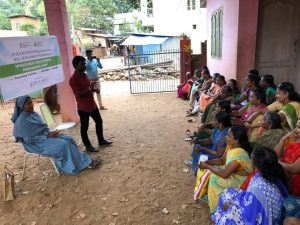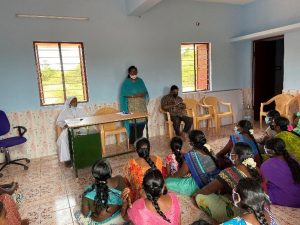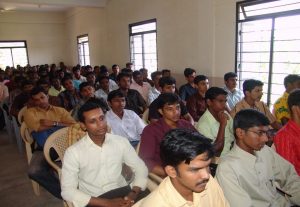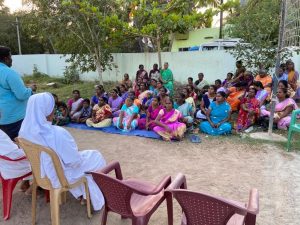Entrepreneurship
ENTREPRENEURSHIP AND SKILL DEVELOPMENT TRAINING (EDP)
In 1996, Women were trained in income generating projects and taught how to save. In 2006 Self Help Groups of women and men were trained as entrepreneurs. They were trained in forty five vocational trades. As our self help group members have proved their credibility, national banks are offering loans to other members to start their own businesses. To date we have: Entrepreneurship Development Training is imparted to the women who are eager to start such micro-enterprises with the financial Assistance of Accenture Sponsored MEDP Programme from EDII Bangalore SMIDS started training programmer. SMIDS staff members are providing effective guidance and facilitation to the women to be successful in their initiative. Marketing linkages arranged for the entrepreneurs to sell their finished products.
- 11219 women self-help group projects
- 2185 men self-help group projects.
ENTREPRENEURSHIP-CUM-SKILL DEVELOPMENT PROGRAMMES (E-SDP)
Entrepreneurship and Skill Development Programme (ESDP) that assists to improve skills and gain knowledge in business. India’s economic advancement or rather its enhancement in any sector majorly depends on the youth of the nation. Focusing on that, awareness regarding the benefits of self-employment is created. Further, to emphasis the necessity for the emergence of entrepreneurship.Such programs attempt to edify various pieces of industrial activity that help youth take up self-employment. Over 50 % of ESDP conducted for the benefits of backward classes of the society. No fees charges for candidates
OBJECTIVE
- To create more self-dependent employment opportunities for the youth
- Promoting the need for new businesses and assist to set up new MSMEs
- To enhant ce he technical skills of entrepreneurs and prospective entrepreneurship
MICROPRENEURSHIP SKILL DEVELOPMENT PROGRAM
SMIDS has been engaged in spreading entrepreneurship in rural areas through EDII, Accenture sponsored Micro Skillpreneurship Development Programme [MSDP].So far, and SMIDS has trained over 3,000 beneficiaries and created over 2000 direct employment opportunities. These training programmes have been spread over 2 states and various sectors such as handicrafts, agro –food processing, value addition to local grown products and eco –friendly products. The enterprises are creating new job opportunities in the local areas and are skilling more and more people, leading to overall economic development of the region.
ENTREPRENEURSHIP AWARENESS PROGRAMMES (EAPs)
With a view to expose students as well as faculty of academic institutions, offering degree/diploma courses in to entrepreneurship as an alternative career, Entrepreneurship Awareness Programme (EAPs) are conducted by SMIDS with the assistance of EDII.
Each Camp, of 2 week duration, is conducted in the premises of an academic institution and aims at creating awareness among students about various facets of entrepreneurship while highlighting the merits of pursuing such a career option. About 50 students are exposed to different aspects of entrepreneurship, including opportunity guidance, services offered by agencies of support system etc. A visit to the industries located in the region is also arranged to bring the students in direct touch with practicing entrepreneurs. Discussion on business ideas, schemes and incentives offered by different agencies. Conducted often in different colleges in rural areas. Thus SMIDS reach out to larger number of women.
MANAGEMENT DEVELOPMENT PROGRAMMES (MDP)
Training existing managers in their chosen domains is as important to the furtherance of management education as is imparting it to the would-be managers. SMIDS realizes this vital need of the economy and accordingly designs and offers a wide array of training programmes on contemporary themes belonging to different functional areas of management.
Each programme is very carefully structured to ensure that it incorporates high quality in it. Our Management Development Programmes are unique learning propositions to the participants and aim at equipping them with the evolving management concepts, practices, perspectives and approaches. They also strive to enable the participating managers develop a sound knowledge base, collaborative analysis and ability to appreciate varied views of a vibrant peer group. The training pedagogies in these programmes are aptly aligned to their specific needs and foster a more effective comprehension through participative learning. Our faculty, offering these programmes, is a perfect blend of knowledge, experience and training skills. This Training was conducted in various locations
INDUSTRIAL MOTIVATIONAL CAMPAIGN (IMC-C)
Industrial Motivational Campaign is conducted for creating awareness about self employment opportunities for educated unemployed youth as well as the student of ITI, Polytechnic, Engineering and Management Institutions of the State. The duration of this programme is one day only.
The main objective of this programme is to motivate the young unemployed youth for their self-employment. During the programme various projects which have potential in particular district are also discussed with the interested participants. The officers of MSME-DI use to explain the topics like MSME-DI activities, quality of entrepreneur, risk taking capacity, Ideas converting into business and strategies for launching new product in the market. The officers from various departments of Central & State Govt. is also invited to explain the activities of their department for the development of Micro & Small Enterprises. This Training was conducted in various locations.
INDUSTRIAL MOTIVATIONAL CAMPAIGN (IMC-Y)
Two Day Industrial Motivational Campaign for Youth (IMC-Y) is an activity to identify and motivate traditional/non-traditional entrepreneurs, having potential for setting up MSEs with an objective of leading them towards entrepreneurship/self-employment.
FINANCIAL SUPPORT TO START INCOME GENERATION ACTIVITIES
Importance of income generation activity, how to identify a viable IGP activity, how to run an IGP activity successfully, marketing strategies, need for innovation, expansion, customer relationship, importance of account keeping, etc were the main topics discussed during the training Mr.. Shivan Ambat ,Mr jaysanker and Ms Sandra Jose , the well-known trainers in Enterprise promotion conducted the session in a very methodic manner for the benefit of the participants. He narrated examples (success stories) of villagers as entrepreneurs to motivate the participants. Group dynamics and group discussions were arranged during the training to ensure involvement of the participants in the training and to make training session more effective. Resource person deliberated in detail about the advantages of starting income generation programme. He said there is a number of chances available for the rural people to start individual income earning activities, which will ensure them a steady income. Increased income will help them to improve their standing in the society.
Participants were very appreciative of the micro-enterprise training they have attended. It sharpened their ideas about micro-enterprises. The coherent teaching imparted during the training days helped the participants to have a holistic understanding of micro-enterprise and its role in alleviating poverty. Mrs. Suma a participant of the EDP training held at Sooriacode said “I am now very much focused about starting my own individual income generation activity to earn additional income for my family. The EDP training has sharpened me on micro-enterprise and it helped me to have a better understanding about micro-enterprise. I am sure the tips I got from this training will help me to be successful in my income generation activity. I advice all those who are eager to start income generation activity to attend EDP training before you jump in to the activity.” Other Participants also echoed similar kind of feelings.
Scanty income of the tribal families is a major problem in the project area. It is hindering their development, especially women and children are the worst sufferers of low income and corresponding poverty. Individual income earning activities are found very effective for the rural tribal families to earn regular income for their families. The mindset of the tribal people also has changed drastically after they are associated with Self-Help Groups and attending different trainings organized by the SHGs. Tribal women are eager to venture into income generation activities. Mobilize necessary initial capital to start income generation programme is the greatest challenge they face in starting their own individual income earning activities.
The project has been very supportive in assisting 200 tribal women to with financial support to start their own income generation programmes. SMIDS identified the beneficiaries to receive the assistance from its existing Self-Help Groups. While selecting the beneficiaries for receiving this assistance, preference has been given to women from economically backward families, families having number of school going children and interest/eagerness to start income generation activity. The selected beneficiaries have given 5 days EDP training to ensure that they will be successful in their income generation activity. Each beneficiary is provided with Rs.15,000/- to start their own income generation units. A total of Rs.30,00,000/- has been distributed as financial assistance to 200 beneficiaries. Given below are the details of fund disbursements for starting income generation programme.
Rev. Sr. Archana Das, SMIDS director, elaborated in detail to the beneficiaries about the purpose for which the financial assistance is given and encourage them to use it judiciously for augmenting their family income. She also explained to them about the financial support provided by various agencies to help the marginalized tribal women to become successful entrepreneurs. Given below is the activity wise distribution of IGP funds.
SMIDS field staff members have provided necessary guidance and facilitation to the tribal women in setting up their income generation units. Field staff of SMIDS ensured that the beneficiaries fully utilized the project assistance to start the IGP activity. SMIDS staff is visiting the IGP beneficiaries periodically to assess the progress of the IGP activity and to provide necessary guidance in running their activity profitably. Beneficiaries are motivated to repay 50% of the financial assistance they received under this project to SMIDS to support other interested SHG women in the coming years. We have given two months moratorium in repaying the financial assistance because they need two months time to settle well and earn income from their new activity. Beneficiaries are repaying Rs.1000/- per month.
Financial support provided under this project has been instrumental for 200 women to become proud owners of their own small income earning activities. This has helped them to earn small but steady income for their families and instilled confidence in them to run micro-enterprises. Table given below shows the income earned by the tribal women from their new income earning activities.
Mrs. Santha Said “Thank you Smids you have touched my life with your generous financial assistance of Rs.15,000/- . I will be ever indebted to you for this timely assistance to my poor family”. Mrs. Santha a widow mother of two school going children is staying in a simple house made of locally available materials and roofed coconut thatch. Her elder daughter Sandra is studying in Standard-VII and younger daughter Soumiya studying in standard-VI. Her husband died due to cancer in his mouth which was big blow to her family.
She started working as an agricultural labour in the local area to feed her children. She was finding it hard to manage her family with little income she earns from the work. She was not getting regular work so she used to borrows money from the money-lenders to meet its food needs.. Major portion of her wage is taken away by the moneylenders as loan repayment. Literally her family was leading a hand to mouth existence.
She is an active member of Self-Help Groups promoted by SMIDS in her village (Vellambi). She is very regular in attending the Group meeting and all its activities. Her association with the SHG sharpened her mind and motivated her to venture into income generation activities. She got different ideas from the SHG meetings and different trainings she attended as SHG member. She was eager to start cow rearing as an income earning activity to earn extra income for her family. Initial capital to purchase a cow was a big problem for their economically deprived women and there was nobody to support her in this difficult situation.
Tribal Development Programme Sizable number tribal population is there in our district. They live a neglected life. The fury of development has not reached to these people and they lead a hand to mouth existence. SMIDS has initiated different programmes for the integrated development of the tribal community, Kani tribes living in the district. Tribal women are organized into groups, promoted saving habits, children are sponsored for their education, evening tuition programme for the school going children are few activities to mention. Awareness programme on alcoholism, environment protection, importance of education etc are organized for to change the mindset of the tribal people. Sisters has developed a good rapport with the tribal families in the target area, which helps us to implement different programmes for their development.
- 14 Tribal students have completed their graduation with our timely support and guidance.
LIVELIHOOD ENTERPRISE DEVELOPMENT PROGRAM WITH THE ASSISTANCE OF NABARD
Livelihood and Enterprise Development Programme (LEDP) for creating sustainable livelihoods amongst SHG members through this SMIDS conducted LEDP ON TAILORING IN KANYAKUMARI DISTRICT and COCUNUT BASED ACTIVITIES IN THIRUNELVELI DISTRICT. Thus SHG members got up income generating activity for livelihoods SMIDS also giving them intensive training and hand holding Support for marketing and other skills. To meet these objectives. Through these two programmes 180 SHG members and their families are benefitted.
By adopting a comprehensive approach, the SMIDS programme strives towards improving the productivity of rural assets and skill sets, resulting in income enhancement. The programme builds the capacities of farmers around improved agricultural practices in collaboration with different development agencies. The cost reduction strategies and package of practices promoted by SMIDS are enhancing household income through agriculture and agri-allied activities. The interventions taken up include improving productivity of land through improved agriculture practices, and agri-allied interventions like poultry, dairy, fishery, vegetable cultivation etc.
The programme is also engaged in farm and non-farm skilling through institutional collaborations and strategic linkages with government, non-government and private partners that contribute to enhancing income levels of households. There are two Major programme conducted
CAPACITY BUILDING TRAINING FOR THE SHG LEADERS
SHGs are found very effective in promoting resourcefulness among the rural poor people and to promote micro-enterprises among them. Self-Help Groups formed by SMIDS were in the pre-school stage on matters of development. SHGs were providing a platform for them to come together and mobilize their savings in it. SMIDS was very much eager to orient the SHG leaders with appropriate management skills and techniques which will help them to provide effective leadership to their Self-Help Groups. This calls for orienting the leaders and members with social orientation and help them to develop proper systems to manage their group resources. We have organized 40 capacity building programmes for the SHG leaders under this project. Given below are the details of the capacity building trainings organized under this project.
These interventions promote collective ownership, decision-making and catalyse collective action for sustainable development.
The community drives the social, economic and ecological transformation processes in their respective villages to bring about change in quality of life. Dedicated leaders are cultivated to sustain the momentum of change. Women are empowered to be financially self-reliant and become catalysts for socio-economic change in the village. The programme has built and strengthened more than 150 village level community-based organisations and mentored 3 Farmer Producer Organisation (FPO).
There was on an average 30 participants per training. From each Self-Help Group president, secretary and treasurer participated in the training. The duration of the training was of 3 days. It was a non-residential programme. Qualified and experienced persons associated with NGOs were the resource persons for the training. Sessions were conducted in an interactive manner to keep alive the interest of the participants in the trainings. Lecture, Group dynamics, group games, group discussions were the methodology used for the training. Resource persons were very down to earth people who conducted the sessions in a very effective manner.
Topics like importance of Self-Help Groups in rural development, Collective leadership, Transparency in fund management, Need for collective action, problem identification and decision making, networking with others were the main topics discussed during the training. Resource persons highlighted the benefit of working in Self-Help Groups and how effective SHG in empowering the rural poor. SHGs provide a platform for the villagers to develop their inborn talents and help them to free themselves from the clutches of the moneylenders. Resources persons shared the importance of transparency in managing the group funds. By effectively revolving their group savings they can achieve self-sufficiency. Conscious efforts have been taken by the resource persons to orient the SHG leaders with social outlook. SHG leaders were motivated to identify social issues/problems, which are hindering their development and plan collective actions to solve/reduce such issue. Need for networking with other like-minded organizations/individuals in dealing social/community issues were also discussed during these capacity building programmes.
The capacity building training programme was found very effective in equipping the competence of the SHG leaders in managing their respective SHGs. They have gained considerable insight about people’s Organization (Self-Help Groups) and importance of orienting its members with social outlook. We have noticed qualitative changes in the leadership capacities of the SHG leaders who have undergone the capacity building training. Mrs. Silochana a participant of the capacity building programme organized at Mothiramala said “the capacity building training programme was much beneficial for me to know more about Self-Help Group and to understand my role as SHG leader. Further I learned that SHGs can provide effective leadership to the community in solving social/community problems”.
HANDICRAFTS / ARTISANS PROMOTION
Handicrafts sector lacks support that meet the basic needs to make it enviable, attractive and dignifying in other to encourage youth interest attractions in acquisition and practice. The master artisans are dying due to aging and the younger generations are not encourage by lack of support and empowerment of for artisan and those still practicing it lacks knowledge of better services attitude and customer retention. It needs improvement.
Government of India has got a number of welfare programmes for the benefit of the people, who are engaged in handicrafts. In order to avail these schemes they have to enroll in the handicrafts commission as members. SMIDS consider it as a possibility for the rural poor engaged in handicrafts to avail schemes from government for their socio-economic development. SMIDS took an extensive effort to identify such people from its operational area.2539 members are enrolled in the scheme after conducting proper skill test. SMIDS is planning skill up gradation training for the artisans area wise in the coming days and facilitate them to get schemes from central government and motivate them to participate in trade fairs to sell their products.



